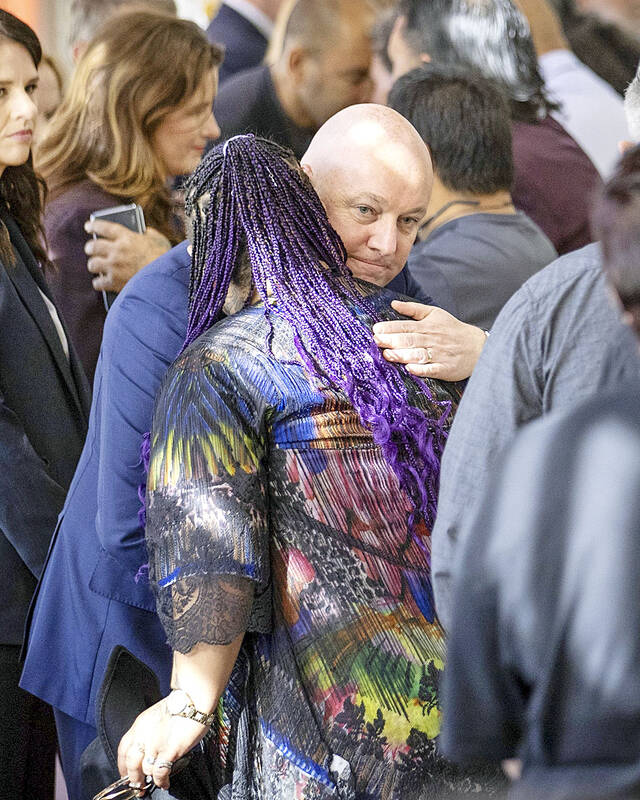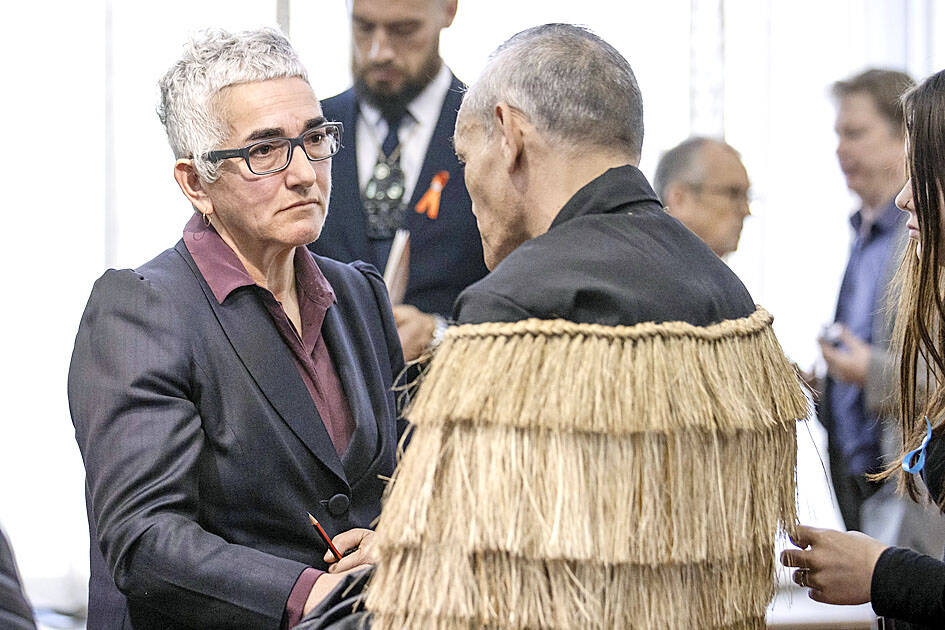New Zealand Prime Minister Christopher Luxon yesterday delivered a historic apology to victims abused in state care, acknowledging the “unimaginable pain” suffered within children’s homes and psychiatric hospitals.
About 200,000 vulnerable New Zealanders were abused in state care in the seven decades since the 1950s, according to a six-year public inquiry that described its findings as an “unthinkable national catastrophe.”
Youngsters were sexually abused by church carers, mothers were forced to give up children for adoption and troublesome patients were strapped to beds for seizure-inducing electroconvulsive therapy.

Photo: AP
Luxon apologized on behalf of successive governments that turned a blind eye to such harrowing reports.
“I am sorry you were not believed when you came forward to report your abuse,” he said in an address delivered to parliament.
“Some of you may feel my words count for little after so long and so much hurt ... but I hope that today, with this apology and the acknowledgement of your burden, it becomes a little lighter for some of you,” he said.

Photo: AP
Survivors packed a public gallery inside New Zealand’s parliament to watch Luxon deliver the apology, many of them weeping and overcome with emotion. Others jeered when New Zealand Solicitor-General Una Jagose, accused of hindering survivors’ legal claims, stood at a press conference to give her own apology.
Survivor Tu Chapman told reporters the government had to answer for “decades of abuse, neglect and torture by those running state, church and faith-based institutions.”
Officials had started work to scrub the names of proven perpetrators from street signs and other public memorials, Luxon said.
Churches implicated in the abuse would be expected to “do the right thing” and take part in the redress process, he added.
“I want to acknowledge those of you who struggled to get help from government agencies when you came forward to report your abuse... This has meant you have had to relive your trauma over and over again,” he said.
Luxon singled out the now-notorious Lake Alice psychiatric hospital in rural New Zealand, where patients recalled being sterilized, used for unethical medical experiments and punished with electric shocks.
Many victims reported lingering trauma that has fueled addiction and other problems. The report found that some of the abuse was “overlaid with racism” targeting indigenous Maori. The inquiry was set up in 2018 and has made 233 recommendations that Luxon’s government has promised to consider.

‘WIN-WIN’: The Philippines, and central and eastern European countries are important potential drone cooperation partners, Minister of Foreign Affairs Lin Chia-lung said Minister of Foreign Affairs Lin Chia-lung (林佳龍) in an interview published yesterday confirmed that there are joint ventures between Taiwan and Poland in the drone industry. Lin made the remark in an exclusive interview with the Chinese-language Liberty Times (the Taipei Times’ sister paper). The government-backed Taiwan Excellence Drone International Business Opportunities Alliance and the Polish Chamber of Unmanned Systems on Wednesday last week signed a memorandum of understanding in Poland to develop a “non-China” supply chain for drones and work together on key technologies. Asked if Taiwan prioritized Poland among central and eastern European countries in drone collaboration, Lin

The Chien Feng IV (勁蜂, Mighty Hornet) loitering munition is on track to enter flight tests next month in connection with potential adoption by Taiwanese and US armed forces, a government source said yesterday. The kamikaze drone, which boasts a range of 1,000km, debuted at the Taipei Aerospace and Defense Technology Exhibition in September, the official said on condition of anonymity. The Chungshan Institute of Science and Technology and US-based Kratos Defense jointly developed the platform by leveraging the engine and airframe of the latter’s MQM-178 Firejet target drone, they said. The uncrewed aerial vehicle is designed to utilize an artificial intelligence computer

Renewed border fighting between Thailand and Cambodia showed no signs of abating yesterday, leaving hundreds of thousands of displaced people in both countries living in strained conditions as more flooded into temporary shelters. Reporters on the Thai side of the border heard sounds of outgoing, indirect fire yesterday. About 400,000 people have been evacuated from affected areas in Thailand and about 700 schools closed while fighting was ongoing in four border provinces, said Thai Rear Admiral Surasant Kongsiri, a spokesman for the military. Cambodia evacuated more than 127,000 villagers and closed hundreds of schools, the Thai Ministry of Defense said. Thailand’s military announced that

CABINET APPROVAL: People seeking assisted reproduction must be assessed to determine whether they would be adequate parents, the planned changes say Proposed amendments to the Assisted Reproduction Act (人工生殖法) advanced yesterday by the Executive Yuan would grant married lesbian couples and single women access to legal assisted reproductive services. The proposed revisions are “based on the fundamental principle of respecting women’s reproductive autonomy,” Cabinet spokesperson Michelle Lee (李慧芝) quoted Vice Premier Cheng Li-chiun (鄭麗君), who presided over a Cabinet meeting earlier yesterday, as saying at the briefing. The draft amendment would be submitted to the legislature for review. The Ministry of Health and Welfare, which proposed the amendments, said that experts on children’s rights, gender equality, law and medicine attended cross-disciplinary meetings, adding that